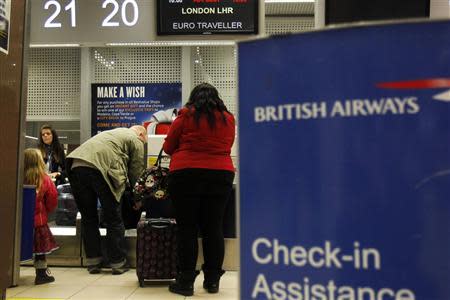EU tries to calm fears of Bulgarian, Romanian exodus

By Adrian Croft
BRUSSELS (Reuters) - The European Union sought to calm fears in countries like Britain, France and Germany that they face a mass influx of Romanians and Bulgarians following the lifting of restrictions on Wednesday, a change that risks fuelling anti-immigrant sentiment in Europe.
From January 1, seven years after their countries joined the EU, Bulgarians and Romanians are free to live and work anywhere in the 28-nation bloc without applying for work permits.
The long-planned change has caused alarm in wealthier EU countries, where right-wing politicians and media are telling people to brace for a flood of southern Europeans who will take jobs from locals, strain public services and scrounge off the welfare state.
"Benefits Britain Here We Come! Fears as migrant flood begins," said the tabloid Daily Express in a front-page headline on Wednesday.
With continent-wide elections to the European Parliament due in May, the scare about 'benefit tourism' provides ammunition for right-wing parties like France's National Front, the Dutch Freedom Party and Britain's UK Independence Party (UKIP).
Seeking to calm the debate, EU Employment Commissioner Laszlo Andor said there were already more than 3 million Bulgarians and Romanians living in other EU states, and ending all restrictions was unlikely to lead to any major increase.
"I firmly believe that restricting the free movement of European workers is not the answer to high unemployment or a solution to the crisis," he said, referring to the EU's lingering economic malaise in the wake of the 2008 global financial meltdown.
'NASTY COUNTRY'
The dropping of the curbs was the lead story in nearly all British media on Wednesday, with reporters heading to airports to interview a trickle of people arriving on flights from Bucharest or Sofia.
British Prime Minister David Cameron has rushed out regulations to stop migrants from the EU being able to claim welfare benefits straight away. Under pressure from UKIP, he has said he wants eventually to restrict migrants from poorer EU states relocating to richer ones.
Bulgarian President Rosen Plevneliev has attacked Cameron's proposals, saying they will damage London's global standing for the sake of short-term political gain.
EU Commissioner Andor said in November that Cameron's suggestions risked "presenting the UK as a kind of nasty country in the European Union", a comment that infuriated the prime minister.
In Wednesday's statement, Andor acknowledged that a sudden large influx of people from other EU countries could strain education, housing and social services in particular regions.
But the solution was to "address these specific problems, not to put up barriers against these workers," he said in a statement that did not single out any EU country for criticism.
Andor said that, in hard times, people who went to work in other EU countries were "all too often an easy target", accused of taking jobs from local people or of abusing social welfare.
"In fact, studies have consistently shown the benefits of free movement of workers for the economies of host countries. Mobile workers complement host country workers by helping to address skills gaps and labour shortages."
The European Commission estimates there are around 2 million unfilled job vacancies in the EU, he said.
Because a greater proportion of people who moved to other EU countries were of working age compared to host populations, they were more likely to be employed and were generally net contributors to the welfare system.
(Additional reporting by Estelle Shirbon; Editing by Mark Trevelyan)


